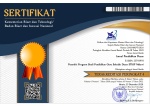The Correlation between Mathematics Comprehension and Student’s Self-Efficacy on Fractional Mathematics Learning
DOI:
https://doi.org/10.46368/jpd.v9i1.351Abstract
Abstract: In the process of teaching and learning mathematics, students usually have an anxiety. One of the anxieties faced by students of elementary schools is tend to hesitated in answering questions because of a lack by self-efficacy and mathematical comprehension. Therefore, this study aims to determine the correlation between mathematics comprehension and student’s self- efficacy on fractional mathematics learning. The method used in this research is a correlational design. The population is all second grade students in North Sumedang. The second grade student’s in the experimental classI (Panyingkiran III Elementary School) and class II (Sukamaju Elementary School) as the research samples. Normality test used by Kolmogorov-Smirnov and correlation test used by Spearman's rho. The results of this research are: 1) There are positive correlation between the mathematics comprehension and student’s self-efficacy on fractional mathematics learning and 2) there are similarities in characteristics between student's of mathematics comprehension and student self-efficacy, so that 28.09% of the variation in achievement students' mathematics comprehension can be influenced by students' self- efficacy.
Â
Keywords: Mathematics Comprehension, Self-Efficacy, and Fractional Mathematics Learning.
References
Creswell, J.W. (2014). Research Design Qualitative, Quantitative, and Mixed Methods Approaches Fourth Edition. California: Sage Publications, Inc.
Kesumawati, N. (2008). Understanding of Mathematical Concepts inMathematics Learning. National Conference on Mathematics and Mathematics Education 2. 231-234, PGRI University: Palembang.
Laurens, T., Batlolona, F.A., Batlolona, J.R., dan Leasa, M. (2018). How Does Realistic Mathematics Education (RME) Improve Students’ Mathematics Cognitive Achievement. EURASIA Journal of Mathematics, Science and Technology Education, Vol. 14, No. 2, pp. 569-578.
National Council of Teachers of Mathematics (2000). Principles and Standars for School Mathematics. Reston, VA: NCTM.
Sunaryo, Y. (2017). Measurement of Student Self-Efficacy on Learning Mathematics in Mts N 2 Ciamis. Journal of Mathematical Theory and Research (THEOREM), Vol. 1, No. 2, pp. 39-44.
Zakaria, et al. (2012). Mathematics Anxiety and Achievement among Secondary School Students. American Journal of Applied Sciences, Vol. 9, No. 11, pp. 1828- 1832.





